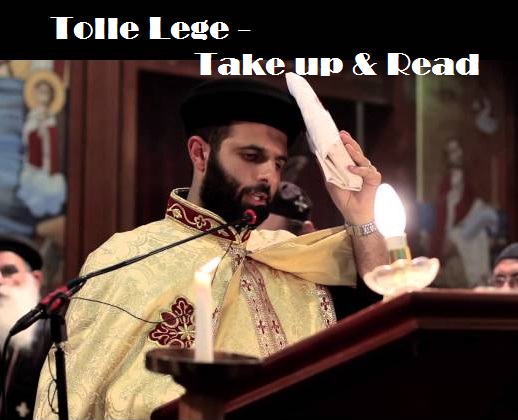The exercise of reading conjures up all kinds of different feelings and emotions for different people. For some, reading is one of life’s greatest pleasures, for others readings is an avenue for attaining and retaining desired knowledge, but for many others, the exercise of reading is so foreign that they often claim: ‘I have never …
The exercise of reading conjures up all kinds of different feelings and emotions for different people. For some, reading is one of life’s greatest pleasures, for others readings is an avenue for attaining and retaining desired knowledge, but for many others, the exercise of reading is so foreign that they often claim: ‘I have never read a book from cover to cover’. School students are always reminded that reading is an essential element in developing their literacy skills. What about the Orthodox Christian servant? Is reading an essential element in developing ‘spiritual literacy’ skills?
The role of the servant, simply speaking, is to fill those whom he/she serves. The servant is required to fill them with Christ, with the Church, with love, with teaching and so on. The servant however, can only fill another to a level no higher than he/she has personally attained. To demonstrate this point, let me explain to you how petrol is stolen from cars (Please don’t get any ideas). The increase in petrol prices has unfortunately driven an increase in petrol thefts. But have you ever wondered how petrol is stolen? A simple physics concept called siphoning is used. A siphon is a continuous tube that allows liquid to drain from a reservoir through an intermediate point that is lower than the reservoir, the flow being driven only by the difference in hydrostatic pressure without any need for pumping. Only one condition is necessary – that the final end of the tube be lower than the liquid surface in the reservoir. This same requirement is also necessary for the servant. How can a servant fill anyone spiritually if he/she is not on a higher spiritual level than those they are serving? How can a servant teach, if they first haven’t filled themselves with knowledge? How can a servant fill anyone with love, if they are not first inflamed with the love for God and the neighbour?
Reading is one effective avenue for a servant to fill themselves continually. St. Paul, realising the importance of reading for the servant, exhorts the young St. Timothy saying: “Till I come, give attention to reading…” (1 Tim 4:13). Reading has often been viewed as a means to attain knowledge, but in fact reading is not only a means to attain knowledge, but a means to be transformed in every aspect of the spiritual life. H.H. Pope Kyrillos, a holy man of prayer, suggests that reading is an essential element to an effective prayer life. He says:
“Honour reading and persist in it, if possible, more than prayer. Reading is the spring of intelligent prayer”
Having now established the importance of reading for the servant, how then should reading be approached? What should be our intention as we read through sacred scripture and other spiritual books? Very simply, reading should be approached as a life transforming exercise. St. Augustine used the metaphor of fire when encountering any spiritual text; “I was on fire as I read” he would say. In the Confessions he Page 3 reconstructs his first reading of a psalm as a newly converted catechumen. He said, with intense excitement and his experience like fire:
“How loudly I cried out to you, my God, as I read the psalms of David…How loudly I began to cry out to you in those psalms, how I was inflamed by them with love for you and fired to recite them to the whole world, were I able…I shuddered with awe, yet all the while hope and joy surged up within me…I trembled as I heard these words…How these words moved me, my God…As I read these words outwardly and experienced their truth inwardly I shouted with joy…The next verse wrung a cry from the very depths of my heart I read on and on, all a fire.”
The Lord answered the prayers of St. Monica, by calling St. Augustine to read. As he was sitting in a garden, he heard some children singing: “Tolle lege, tolle lege” (“Take up and read, take up and read”). He responded to this call by opening the sacred Scriptures and reading a verse that would forever change the course of his life:
“Let us walk properly, as in the day, not in revelry and drunkenness, not in lewdness and lust, not in strife and envy. But put on the Lord Jesus Christ, and make no provision for the flesh, to fulfill its lusts.” (Romans 13:13-14).
St. Augustine would later recount this event saying:
“I had no wish to read further, nor was there need. No sooner had I reached the end of the verse then the light of certainty flooded my heart and all dark shadows of doubt fled away”.
The transformative reading experience of St. Augustine and other saints like St. Anthony who changed their direction in life from a single verse, reveals to us the potential impact reading can have on our lives. We must learn to read for life, to read for transformation.
But what sort of literature should we read? you may be asking.
When Fr. Tadros Malaty was in Sydney not so long ago, I was given the privilege of driving him to one of his appointments. I was very excited that I would get a whole hour of un-interrupted discussion with him and I could ask him all the questions I wanted. When we got in the car I thought long and hard about a good question to ask him. I wanted the question to be an intelligent one, worthy of the person I was asking. I remembered that he really enjoys reading and writing so I thought of the perfect question to ask (well at least I thought it was perfect at the time): “Abouna, what’s your favorite book that you have read” I asked. Without a second to think, he responded “the Bible”. After taking a moment to swallow my pride due to the not so intelligent question, I realised how essential it is for the Bible to be the centre and core of our reading. It is the most life-transforming text you will ever read.
Having the Holy Bible as the centre of our reading, we should also ensure that our reading is well balanced covering all areas such as Bible commentary (especially from the Church fathers), spiritual, social, theology, Church History, Saints and so on. Let us draw upon the wealth of Orthodox literature that is now readily available to us in the English language.
May we respond to the same call that St. Augustine received: “Take up and read, take up and read” and may we moreover be transformed in the same way St, Augustine was transformed. By in so doing, we will also transform those whom we serve, Amen.
Join Us: Sign Up Today!
Tags:












